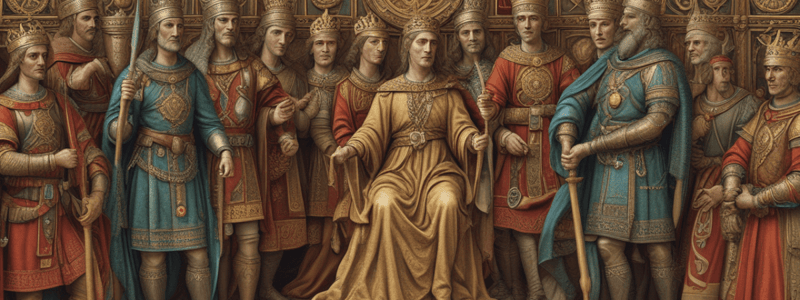Podcast
Questions and Answers
Match the Anglo-Saxon social class with its description:
Match the Anglo-Saxon social class with its description:
Earls = The ruling nobility and the king's 'right hand man' in a shire Thegns = Formed the backbone of the Anglo-Saxon army and received lands from the king for good service Freemen = Upper group of commoners who held land freely and did not pay rent to a lord Serfs = Legally recognized as enslaved with no civil rights but could work on their own behalf
Match the following terms with their meanings in Anglo-Saxon England:
Match the following terms with their meanings in Anglo-Saxon England:
Witan = Council of leaders that had the right to choose the best successor to the throne Shire = Territory governed by an earl who was the king's 'right hand man' Kingdom of Wessex = Royal family universally recognized as the English royal family by the middle of the 9th century Landholding = Received by some for good service, rising to become earls or freemen
Match the following economic activities with the respective social groups in Anglo-Saxon England:
Match the following economic activities with the respective social groups in Anglo-Saxon England:
Craft activities like blacksmithing = Lower group working on land held by a lord or for others Selling or exchanging crops = Done by freemen who held land freely and did not pay rent to a lord Working for others in exchange for food and shelter = Done by many who held no land in exchange for basic needs Earning enough to buy own freedom = Possible for those legally recognized as enslaved with no civil rights
Match the Anglo-Saxon official with their role:
Match the Anglo-Saxon official with their role:
Match the Anglo-Saxon court with its description:
Match the Anglo-Saxon court with its description:
Match the Anglo-Saxon penalties with the crimes:
Match the Anglo-Saxon penalties with the crimes:
Match the Anglo-Saxon building materials with their usage:
Match the Anglo-Saxon building materials with their usage:
Match the Anglo-Saxon settlement feature with its purpose:
Match the Anglo-Saxon settlement feature with its purpose:
Match the Anglo-Saxon ruler with their contribution:
Match the Anglo-Saxon ruler with their contribution:
Match the Anglo-Saxon settlement type with its description:
Match the Anglo-Saxon settlement type with its description:
Match the Anglo-Saxon trading goods with their exchange items:
Match the Anglo-Saxon trading goods with their exchange items:
Match the Anglo-Saxon fortification steps with their descriptions:
Match the Anglo-Saxon fortification steps with their descriptions:
Match the Anglo-Saxon terms with their meanings:
Match the Anglo-Saxon terms with their meanings:
Succession to the throne in Anglo-Saxon England was determined by the ______
Succession to the throne in Anglo-Saxon England was determined by the ______
The earl in Anglo-Saxon England was the king's 'right hand man' in a ______
The earl in Anglo-Saxon England was the king's 'right hand man' in a ______
The upper group of commoners in Anglo-Saxon England who held land freely were known as ______
The upper group of commoners in Anglo-Saxon England who held land freely were known as ______
The group of commoners in Anglo-Saxon England who worked on land held by a lord were known as ______
The group of commoners in Anglo-Saxon England who worked on land held by a lord were known as ______
The backbone of the Anglo-Saxon army were the ______
The backbone of the Anglo-Saxon army were the ______
In Anglo-Saxon England, some freemen were expected to attend local courts to solve ______
In Anglo-Saxon England, some freemen were expected to attend local courts to solve ______
The head of the shire was called a shire-reeve or ______
The head of the shire was called a shire-reeve or ______
A group of ten Tithings was known as the ______
A group of ten Tithings was known as the ______
The biggest house in an Anglo-Saxon village was the ______, where the king and his warriors lived
The biggest house in an Anglo-Saxon village was the ______, where the king and his warriors lived
Anglo-Saxon houses were largely made of timber, leather, and ______
Anglo-Saxon houses were largely made of timber, leather, and ______
In exchange for free plot of lands, settlers built ______
In exchange for free plot of lands, settlers built ______
The fine for breaking into someone's home was five ______, paid to the home-owner
The fine for breaking into someone's home was five ______, paid to the home-owner
Most villages were secured with high ______ for protection
Most villages were secured with high ______ for protection
Anglo-Saxons didn't have ______, instead people found guilty of crimes were either executed or fined
Anglo-Saxons didn't have ______, instead people found guilty of crimes were either executed or fined
The Anglo-Saxons both domesticated and ______ animals for food
The Anglo-Saxons both domesticated and ______ animals for food
Alfred the Great began the policy of fortification of towns, or ______
Alfred the Great began the policy of fortification of towns, or ______




